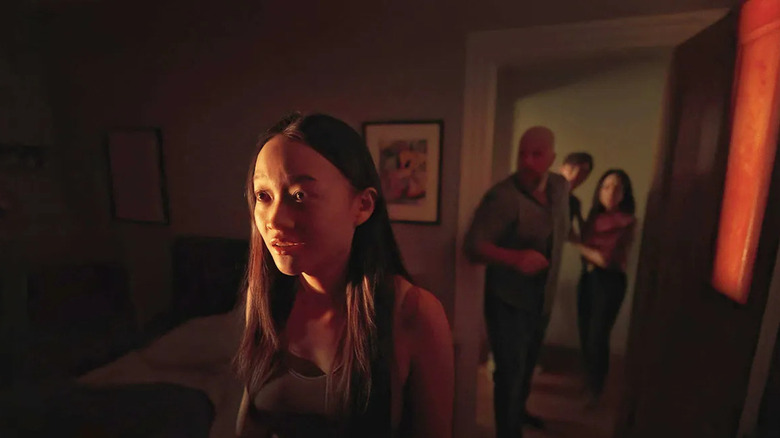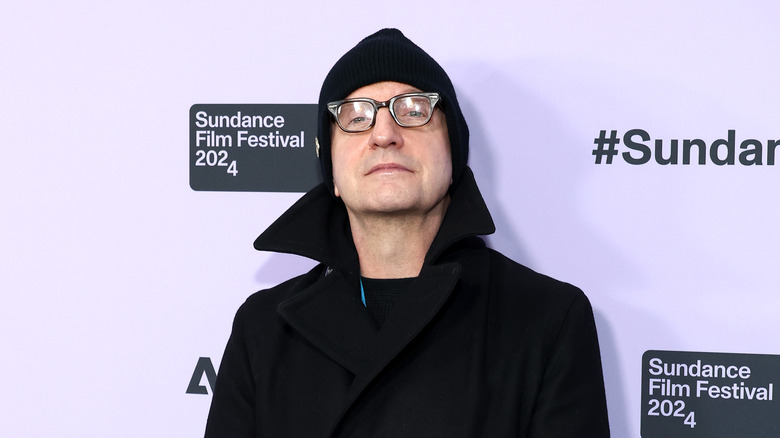Presence Review: Steven Soderbergh Takes POV Cinema To New Heights With A Suspenseful, Terrific Ghost Story [Sundance]
Perhaps the biggest reason why the ghost story has enjoyed such popularity and power for so long is because it lies at the crux of some of humanity's most fundamental mysteries. For one thing, it addresses the question of life after death in a way that doesn't require belief in pearly gates or eternal hellfire, as it presupposes the existence of the soul. After all, if a person's energy can change the mood of a room, can't that same energy exist independently of a body and remain noticeable? Additionally, the total unknowability of ghosts is at once a source of fear and melancholy: if such entities exist, we can't know for sure what their intentions are, and if we might be facing such a fate, wouldn't such constraints as having no body and no voice be remarkably frustrating and lonely?
Steven Soderbergh's latest feature, "Presence," addresses these concepts in a remarkably effective fashion. While the basic tropes of the haunted house ghost story are present in the film, it's thanks to Soderbergh's maverick, almost impish auteurist tendencies that it transcends and remixes those tropes due to one major change: the entire film is shot from the entity's point of view. This is more innovative than it sounds; while it's true that movies and especially horror films are no strangers to POV, the majority of POV films are of the "found footage" subgenre, and that's explicitly not the case in "Presence." In fact, Soderbergh's film belongs less to the found footage camp but more to films like "Lady in the Lake" and "Hardcore Henry," POV movies where we're seeing events through the eyes of a character and not a camera per se.
Who that character is and what, if anything, they may want lies at the core of "Presence," creating a remarkable sense of tension throughout the film. What Soderbergh, screenwriter David Koepp, and the movie's game ensemble cast have constructed here is a work of such intimate and immediate suspense that the film gets at what most powerfully motivates the ghost as a folkloric, horror/fantasy character: powerlessness.
This house is not a home
Like so many modern ghost stories (from "The Amityville Horror" to several entries in the "Paranormal Activity" series), "Presence" begins with a family purchasing a new house, making a deal that seems too good to be true. After purchasing their home from a sweet-talking real estate agent (played by Julia Fox), the family — mom Rebecca (Lucy Liu), dad Chris (Chris Sullivan), son Tyler (Eddy Maday), and daughter Chloe (Callina Liang) — move in and almost immediately begin having issues that have nothing at all to do with the supernatural presence watching them. Rebecca is involved with some type of illegal financial scheme that supposedly will benefit aspiring jock Tyler, Chris is quietly investigating whether or not it makes legal sense to divorce his wife, and Chloe is lonesomely dealing with the loss of one of her best friends, Nadia, a girl in town who died after apparently overdosing.
It's during her solitary moments that Chloe begins to become aware of the presence that seems to be fixated on her, and while initially it's possible that the ghost may not have her best intentions at heart, with each passing encounter it seems that it's trying to look out for her. At the very least, it appears to be agitated whenever Tyler mistreats her, or when Tyler's friend (West Mulholland) becomes her new secret boyfriend. From this, Chloe presumes that the entity in their house may be Nadia's spirit, attempting to either achieve revenge for what may have been her murder or, alternatively, looking to simply not be forgotten.
The biggest element within Soderbergh's filmography is the notion of confession — from "Sex, Lies, and Videotape" to "Kimi" (his prior collaboration with Koepp), his films feature characters telling the audience and/or each other their deepest secrets in various ways. The central gimmick of "Presence" allows this idea of the confessional to happen naturally: of course these people are speaking and acting frankly, because they have no idea that someone is watching them. That the "someone" is both a presence within the film and without it — i.e. us audience members — is something Soderbergh seems cognizant of throughout, and he blurs the lines between participant and viewer in a way that feels thrillingly Nouvelle Vague.
The haunted and the hurt
Although it's riffing on a well-worn subgenre of horror, "Presence" isn't a horror film per-se; after all, it's difficult to make an audience scared of a ghost when, for all intents and purposes, we are the ghost. As such, "Presence" is a far more spiritual and introspective movie than one engineered for jumpscares and thrills. In its usage of the ghost as a silent, largely powerless observer, "Presence" most closely recalls David Lowery's "A Ghost Story," especially when it comes to the mysteries surrounding this particular specter: where did it come from? What does it want? Who, if anyone, does it represent?
When "Presence" delves into the more typical trappings of the genre — everything from a scene where a psychic investigates the house to moments of seance-like invocation — it still retains its unique voice, thanks not just to Soderbergh but Koepp. The latter is not just a screenwriter, of course, but a director in his own right, helming in particular 1999's "Stir of Echoes," a film that similarly deals with the mysteries of the supernatural alongside a pulpy genre narrative. Through its ingenious stylistic gimmick, "Presence" can comfortably feature metaphysical discussions of the afterlife and psychic ability alongside the notion that Nadia and her friends may have been the victims of non-supernatural foul play. All of this contributes to the film's remarkable sense of tension, the powerlessness of the ghost replacing its invisibility.
The most impressive thing about "Presence" is the way it can juggle all these aspects and make them feel fulfilling instead of distracting or tangential. It works as a straightforward genre narrative, it works as a philosophical musing on the melancholic frustrations and anxieties of the afterlife, and it works as a meta-commentary on the camera's and the audience's relationship to cinema itself. Soderbergh has sometimes been seen as an arch satirist, someone who's always approaching material from a place of cynicism or detachment; this movie will not silence such detractors, given the gimmick as well as other elements such as the credits being presented in a font that's highly reminiscent of the one used for "Poltergeist." Where people may see irony, however, I see investigation. Soderbergh, as an artist, seems to constantly be asking why: why (and how) things work, why people do what they do, and so on. He loves a mystery, and "Presence" delivers some satisfyingly moving answers while leaving behind some tantalizingly haunting questions.
/Film Rating: 9 out of 10


